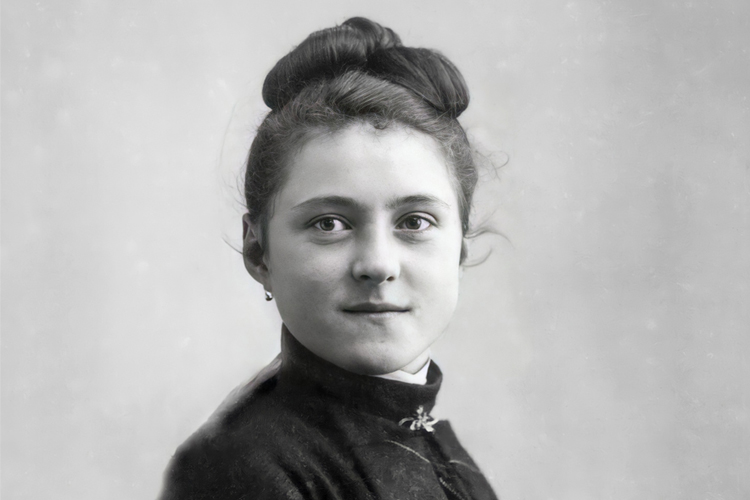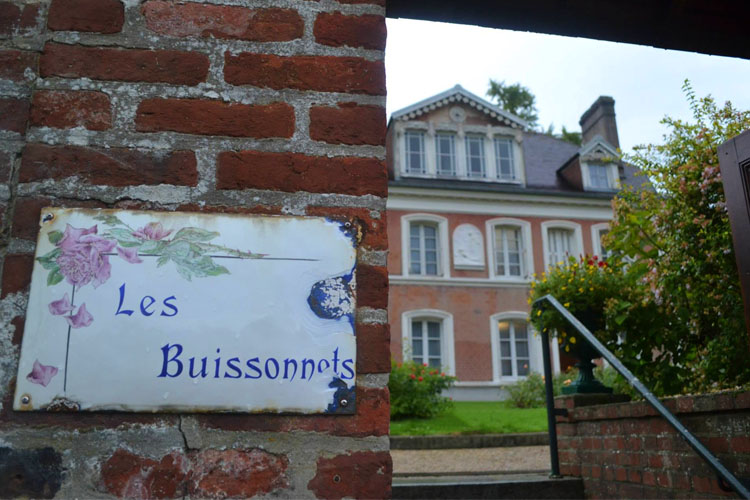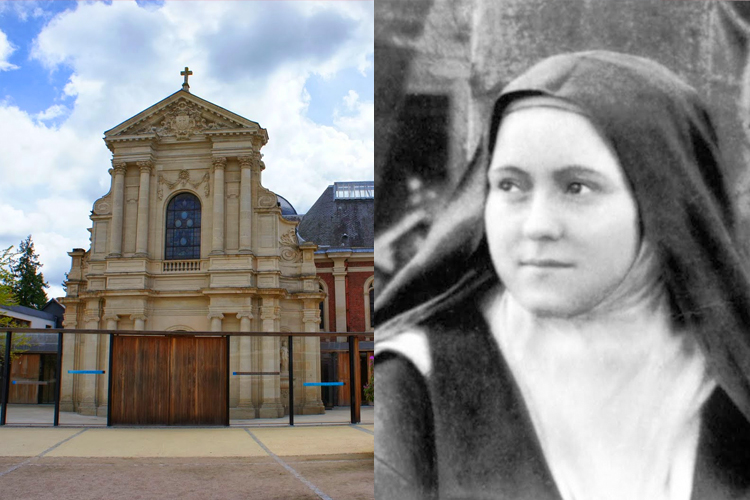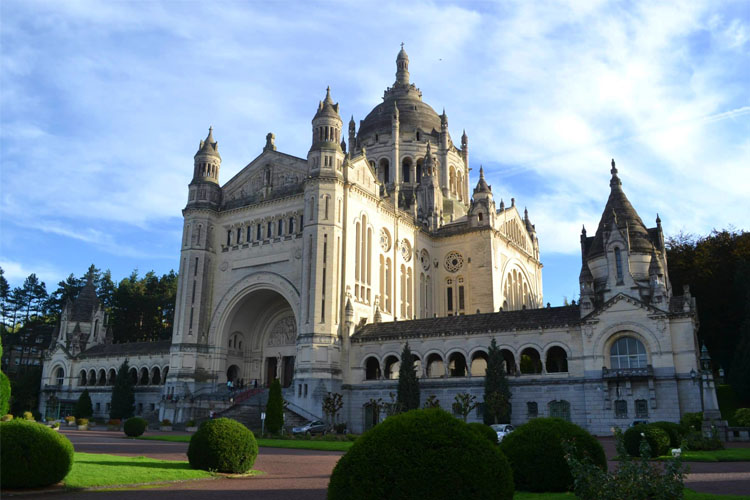
Feast Day: 1 October
Summary
Saint Therese of Lisieux is a French saint who was born on 2 January 1873 and died on 30 September 1897, at the age of 24. She was an affectionate girl in her early childhood, but the death of her mother at the age of four had a profound effect on her. She grew an increasing desire to follow her sisters into the Carmelite convent in Lisieux, even appealing to the Pope in person to let her in early.
Therese is perhaps best known for her autobiography, The Story of a Soul, and her Little Way of Spiritual Childhood, which helped make her a Doctor of the Church. Saint Therese of Lisieux died after suffering from tuberculosis. She was declared a saint on 17 May 1925 by Pope Pius XI.
The “sunny years” of early childhood
Therese was born in the little French town of Alençon. Her full name is Marie Françoise Thérèse Martin, but she later became known as Saint Therese of the Child Jesus, or more popularly the Little Flower.
Her parents, Louis and Zélie, were devout Catholics, going to Mass every morning before work. Therese, the youngest of nine children, grew up in a strong and loving Catholic environment.
In The Story of a Soul, Saint Therese talks about “those sunny years of childhood”, growing up in a warm and joyful home. “My first recollections are of loving smiles and tender caresses. But if God made others love me so much, He made me love them too, for I was of an affectionate nature. You can hardly imagine how much I loved my father and mother.”
From the earliest age, Therese was very direct and had great strength of purpose. Her mum writes of her, “When she has said ‘No’, nothing will make her change. One could leave her all day in the cellar without getting her to say ‘Yes’, she would sooner sleep there.” Her older sisters helped guide her character, teaching little Therese about self-control and self-sacrifice.

Death of her mother
The death of her mother, at the age of four and a half, had a profound effect on Therese. She became reserved and very sensitive, easily bursting into tears. Therese’s family soon moved from Alençon to Lisieux, into a new home called Les Buissonnets.
For Therese, with her mum having now passed away, she felt a growing connection to Heaven, feeling the eternal was her real home; Earth increasingly felt like a passing, transient thing. She would sit amid the flowers in the fields near her house, “I listened to distant far-off sounds and the murmuring of the wind. Earth seemed a place of exile and I dreamed of Heaven.”
However, if Therese was feeling more and more detached from this world, she was never detached from human love, “God has given me a faithful heart, and when once I love, I love forever.”

Difficulty at school
Saint Therese later began attending school. However, she didn’t like it, stating “the five years I spent at the school were the saddest in my life.” She loved catechism, history and science and, because of her intelligence, advanced from the eight year old class to the fourteen year old class. This created envy in her classmates. During her time at school, she was at ease only with her sisters and a few others.
Her sister Pauline had been like a second mother for little Therese during these years. However, she was to leave her and enter the Carmelite convent in Lisieux, which would mean Therese could see her only two to three minutes a week. This devastated her, “I was about to lose my second mother. How can I express the anguish of my heart!”
Desire to become a nun
Therese really wanted to join the convent and become a nun, following in the footsteps of her much-loved sisters. She wasn’t even 15 when she and her father went to the priest in charge to ask for permission. He refused, but added, “you can always see the bishop. I am only his delegate.” And so Therese went to meet the Bishop Hugonin of Bayeux.
She entered the bishop’s office with her father and surprised him with her request. “You are not yet fifteen and you wish this?” the bishop said, to which Therese replied, “I wished it since the dawn of reason.” Bishop Hugonin didn’t immediately grant Therese her request and said he would consider it. Not content with this answer, Therese then made the boldest of decisions – to ask the Pope himself!
Therese appeals to the Pope himself
Part of a group of French pilgrims to Italy, Therese went with her father and sister Celine to the Eternal City. On the day of their audience with Pope Leo XIII, Therese was told that people weren’t allowed to speak to the Holy Father, because it would prolong the audience too much.
But Therese being Therese, when it came to her turn, she fell to the Pope’s feet and, lifting her tear-filled eyes to him, said “Most Holy Father, I have a great favour to ask you! Holy Father, in honour of your jubilee, permit me to enter Carmel at the age of fifteen.” Leo XIII replied “You will enter if God wills it.” Not wanting to leave the Pope, the papal guards then had to lift her up and carry the tearful Therese to the door.
Shortly after this encounter, however, Therese was accepted into the convent, a few months after her fifteenth birthday.
The Little Way of Spiritual Childhood
After joining the convent, Saint Therese of Lisieux developed her most well-known teaching, the Little way of Spiritual Childhood, or simply the Little Way. I won’t claim to be an expert on the Little Way, but what I understand of Therese’s teaching is that it firstly recognises our littleness and nothingness before God. God, the creator of the universe, is mind-bogglingly more awesome than us. Like Therese once called herself, we are “grains of sand” compared to Him.
It’s in this recognition of our smallness that we can start to understand the Little Way. Therese writes, “[The Little Way] is the way of spiritual childhood, the way of trust and absolute surrender. I want to point out to souls the means that I have always found so completely successful, to them there is only one thing to do here below [on Earth] – to offer our Lord the flowers of little sacrifices and win Him by our caresses.”
The Little Way, therefore, is the sacrifice of ourselves to God’s love. It is when we see everything we do in our daily life as an opportunity to be an example of love. It isn’t possible for all of us to perform grand acts of virtue all the time, but by performing little acts often, we please God and become closer to His love. As Therese says, “Miss no single opportunity of making some small sacrifice, here by a smiling look, there by a kindly word; always doing the smallest right and doing it all for love.”
So by spending our lives doing everything we do in the name of Love, i.e. God, we are living out the Little Way. And it is this Little Way that has inspired millions around the world to be the best person they can be, to be a role model and saint – in short, to be a loving child of God.

Why Saint Therese is important
A reflection from someone in our young Catholic community
I first remember hearing about Therese of Lisieux whilst was working in Brazil. A local girl introduced me to the saint. She loved Therese, and tried to base her life on the Little Way. Although I didn’t read up on the saint at the time, this girl’s living example of Therese’s teaching inspired and moved me greatly. She was ashamed by her less-than-holy teenage years and saw beyond the emptiness of the secular world’s façade of instant happiness. Saint Therese presented her with a way forward, to be reborn in God’s love.
The Little Way brought her quite literally to her knees, sometimes in tears, as she wondered how God could love a sinner like her. In understanding her nothingness before God, she sacrificed her wants and desires in this world, to live for love. “To live in love is to sail forever, spreading seeds of joy and peace in hearts”, said Therese.
I owe so much to Therese. Her life has been a great inspiration to me, to live life the way we’re all meant to live it – for love.
Later during my time in Brazil, I went through a traumatic experience, which left me feeling empty and lifeless inside. But it was in midst of that suffering that a transformation took place. I’d always been an person who believed we are the masters of our own ship, that we are the ones to overcome our trials and difficulties – or at the very most with the aid of family, friends or professionals.
But what I suffered could not be overcome by other people, nor my own reasoning. To cut a long story short, I prayed to God, telling Him that I could no longer follow my own course – that I would let Him into my dying heart and let him steer me to safety.
The next day, I noticed things were different; I saw life in a new light. Whilst I’m heavily abridging what happened that day, it could be summarised here as a discovery of faith – something which, despite being Catholic all my life, I hadn’t ever understood or, I think, had.
Because of this, I saw the true meaning of life – to live for love. Love is all that matters. Our careers and earnings, achievements and deeds, all this ultimately counts for nothing if not for love. Without realising it at the time, what I now felt was very much what St Therese had been saying. Shortly after returning to England from Brazil, a friend coincidentally gave a talk mentioning St Therese, which inspired me to go to Lisieux for the weekend.
It was in reading up about her life before the trip that I realised the Little Flower had been at the heart of all I’d experienced. From the experience of meeting the local girl, to the solitude and darkness and then the renewal and desire to live for love – it all reminded me of the little saint. And so, when I visited Lisieux, it was truly a personal pilgrimage and a physical encounter with the life of Therese, as it included visiting her home and even bedroom.
I owe so much to Therese. Her life has been a great inspiration to me, to live life the way we’re all meant to live it – for love. And though I will fail again and again, I know God will pick me up and help me get back on track in my journey to our true home. I am nothing compared to Him, but in His infinite love for me, he cares about me and, like a parent to their child, wants only my love.

Saint Therese of Lisieux quotes
“I know of one means only by which to attain to perfection: LOVE. Let us love, since our heart is made for nothing else.”
“In times of aridity when I am incapable of praying, of practicing virtue, I seek little opportunities, mere trifles, to give pleasure to Jesus; for instance a smile, a pleasant word when inclined to be silent and to show weariness. If I find no opportunities, I at least tell Him again and again that I love Him; that is not difficult and it keeps alive the fire in my heart. Even though this fire of love might seem extinct I would still throw little straws upon the embers and I am certain it would rekindle.”
“God has given me a faithful heart, and when once I love, I love forever.”
“I get tired of the darkness all around me. The darkness itself seems to borrow, from the sinners who live in it, the gift of speech. I hear its mocking accents: ‘It’s all a dream, this talk of a heavenly country, of a God who made it all, who is to be your possession in eternity! All right, go on longing for death! But death will make nonsense of your hopes; it will only mean a night darker than ever, the night of mere non-existence!'”
“Time is but a shadow, a dream; already God sees us in glory and takes joy in our eternal beatitude. How this thought helps my soul! I understand then why He lets us suffer…”
“My whole strength lies in prayer and sacrifice, these are my invincible arms; they can move hearts far better than words, I know it by experience.”